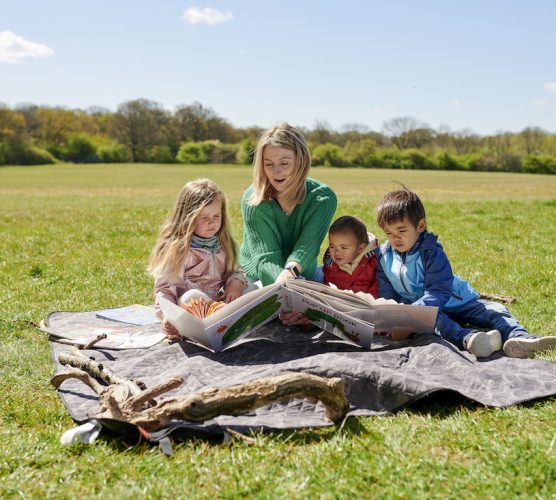It’s not unusual for a teacher to step away from the profession, but still want to make an impact in children’s lives. Fulfilling jobs for ex teachers can be hard to find–but the early years sector could be the answer. Read on to see how you could take teaching out of the classroom, and into your own hands.
Short on time? Read our quick comparison here.
Interested in becoming a childminder?
Taking teaching out of the classroom
Forbes recently reported that almost one in six teachers in England are quitting after just a year in the classroom. In some cases, teachers take parental leave and realise they don’t want to spend time away from their child, so they don’t come back. And once they have a second child, a teacher’s salary doesn’t even cover the cost of childcare. Bizarrely, many parents are forced to leave their career, and stay home with their children to save money.
Because of the immense stress of an educator’s role, and having to bring work home for evenings and weekends, many teachers are experiencing burnout and leaving the classroom in droves. If that’s you, but you are still passionate about education, why not bring it into your own home? Imagine the difference you could make if you worked with a much smaller group of children, instead of juggling the needs of a full classroom of kids.
Many ex-teachers do more than imagine this scenario—they become childminders. They bring their experience and passion for early education into a job with less stress and more autonomy. In fact, it’s one of the most fulfilling jobs for ex teachers we can think of!
Let’s take a deep dive into the similarities between teaching and childminding for current and ex-teachers who want to explore new areas of early education.

What transferable skills are there between teaching and childminding?
Childminders and teachers have a lot of skills in common. Both must enjoy working with children, but what else? Teachers and childminders should:
- Be trustworthy and kind
- Be great at managing groups of children and promoting positive behaviour
- Know how to structure a successful day of learning
- Enable other working parents to thrive in their careers
- Build strong relationships with the children they look after
- Understand the role of Ofsted and the Early Years Foundation Stage (EYFS)
- Be well versed in safeguarding issues
- Care about more than just making money and have a passion for child development
- Understand that children should get to be children
- Have interpersonal skills and sensitivity when talking to parents about a child’s development
What new skills would I learn as a childminder?
Many skills teachers already use in their job make becoming a childminder a logical next step, but there is still plenty to learn. A self-employed childminder working with Koru Kids gains additional support and security—we teach you how to set up your home and run your own business, for starters.
Many teachers are eager to learn more about child development, and understand how to support children’s emotional literacy and resilience. Childminding allows teachers to hone all of these skills—both via training and day-to-day—that they have so little time to focus on in the classroom.
When you become a childminder you will also get to learn about the marketing and finance aspects of running a business. It doesn’t mean you have to deal with taxes or sorting out a pension alone—Koru Kids offers support with all of this. It’s a way for you to gain knowledge and skills without bearing that burden yourself. And if you want to improve your leadership skills, there is always scope to take on one or two assistants, increasing your income and management abilities.

What are the greatest benefits of becoming a childminder?
Family life and childcare costs
Childminders generally have greater control over their own time and how they structure their day. If you have one or two small children at home, you can look after them at the same time, saving on childcare costs. And, you’ll be there as a parent during those special early years.
Less paperwork, more control
Planning next steps for children is a very individual process. Based on the new EYFS framework, Koru Kids encourage our childminders to do this entirely through reflective practice. We love seeing your reflections in a learning journal, but as long as you can demonstrate a deep knowledge of the children in your care at the point of inspection, no paperwork or records are actually required.
Although there are early learning goals to meet, there is freedom over how they are achieved. Relentless spreadsheets and piles of books to mark each day will become a distant memory. A teacher who decides to become a childminder will generally have more time to themselves and their family—no work to bring home in the evenings or at weekends.
Greater impact on childhood development
Because you are only looking after 3 children, you will have more time to spend with them individually. You can tailor your educational approach to each child, and the difference you make will be truly visible.
No Ofsted pressure
If you decide to make the move into childminding with Koru Kids, you can say goodbye to the stress of Ofsted inspections. We are an Ofsted-registered childminding agency, so one of our friendly advisors will carry out inspections and registration visits, in a helpful and friendly manner—being completely transparent about what we expect to observe.
Why become an Early Educator with Koru Kids?
Regardless of the year group you teach, every teacher knows the colossal importance of the early years as the foundation of a child’s learning. At Koru Kids, we call our childminders ‘Early Educators’. That’s because they are doing so much more than ‘minding’ children. A childminder plays a major role in those first steps towards learning and exploration.
We are working to revolutionise childcare, to help families thrive. We are respected and well-loved by thousands of families across London because we believe in what we do. Becoming an Early Educator means joining our mission and championing our Ethos.

What is the Koru Kids Ethos around childhood development?
Our Ethos is heavily influenced by many schools of learning: Montessori,
Reggio Emilia, the Te Whāriki curriculum in New Zealand, and educational influences from China, Sweden, and Harvard. We also follow the Early Years Foundation Stage here in the UK that any teacher will already be familiar with. We focus on learning through play, encouraging independence and mental wellbeing. That’s why Koru Kids childminders are given extra training in EYFS, along with Guided Outdoor Learning.
Why outdoor first?
Guided Outdoor Learning, also known as Forest School, is a teaching philosophy that takes the classroom outside. Children are encouraged to explore the natural world and use their creativity. They get to challenge themselves and develop emotional resilience.
Do you help me fly?
Our entire approach is centred on the child. We know the difference the early years will make, and what an enormous impact that child will have on the future of our world. That’s why we ask 6 questions, from a child’s perspective, to our Early Educators:
- Can I trust you?
- Do you know me?
- Do you help me fly?
- Can I find my path?
- Do you hear me?
- Is this place fair for us?
You can read more about our Koru Ethos here.
How does a childminder’s income compare to a teacher’s salary?
There’s a general perception that childminders don’t earn very much. If you’re an ex-teacher you might not expect that working as a childminder can replace your income, or even allow you to earn more.
In the UK, a teacher in the main pay range could expect to earn between £26,000–£43,000 per year before taxes, depending on their location. This teacher will be working 5 days per week, not accounting for the unpaid time they spend on evenings and weekends.
And, if you are a teacher with small children, you generally spend £10,000–£17,000 of your income on childcare per year. As a childminder you can look after your own child together with the children in your care, so although it will affect the ratio, you will save a substantial amount. You would no longer be spending between one third to one half of your income on childcare.
There are many factors that determine what you will earn as a childminder. Your location in the UK, how many days you work per week, and how many children you can look after. Contact us if you want to find out what you could expect to make as a self-employed childminder working with Koru Kids. In one example in inner London: looking after 3 children for 4 days per week, you’ll earn £40,000 per year before taxes. If you look after your own child, and have 2 children in your home nursery 4 days per week, you would still earn £27,000 per year, with no childcare costs of your own. And, if you work with an assistant, you can earn up to £70,000—all without spending 10 hours a week marking papers.
Won’t childminding be a step backwards in my career?
If you have poured your heart and soul into teaching, spending years gaining the qualifications and establishing yourself as a serious educator, stepping away can be hard. There is a sad tendency to see childminders as little more than unqualified carers.
This could not be further from what we are doing at Koru Kids. Our childminders are professional leaders with the ability to earn up to £70,000 per year. They are dedicated to making a difference in early education, embodying the Koru Ethos in their everyday actions, and committed to changing the future through a passion for learning where it matters.
Who you are as an Early Educator is up to you—much more so as a Koru Kids childminder than as a teacher in most schools across the UK. You finally have the autonomy to teach in a way that is stimulating both to you and the children in your care.

What backup would I receive as a Koru Kids childminder?
On top of all the free training and business set-up, we help you find families, sort payments and policies. Then we continue to provide support and advice, giving our childminders helpful resources like activity cards and learning journals to weave the early years curriculum into your setting.
We offer flexibility as well as stability—you can choose to work 4 or 5 days per week. You can still work term time only, if you want that extra time with your family during school holidays. We also have a Facebook community where childminders can offer each other support and advice, and share their experiences in a safe, nurturing space.
Early Educators stepping into a world of support
A great experience with an adult during the early stages of a child’s life can create a lifelong core memory. That’s why Koru Kids childminders are supported to create a safe and engaging environment for the children in their care. A teacher that decides to become a childminder can take their passion for teaching and incorporate that into the best childcare setting ever created.
If you’re considering a career in teaching, or you have left teaching behind and are looking for a different option, Koru Kids would be delighted to welcome you into the world of childminding. Whether you are making an impact on children’s lives in school right now, or considering becoming a childminder, we salute you. You are making a difference that won’t just affect the children you look after, but the entire global community.
Interested in becoming a childminder?



